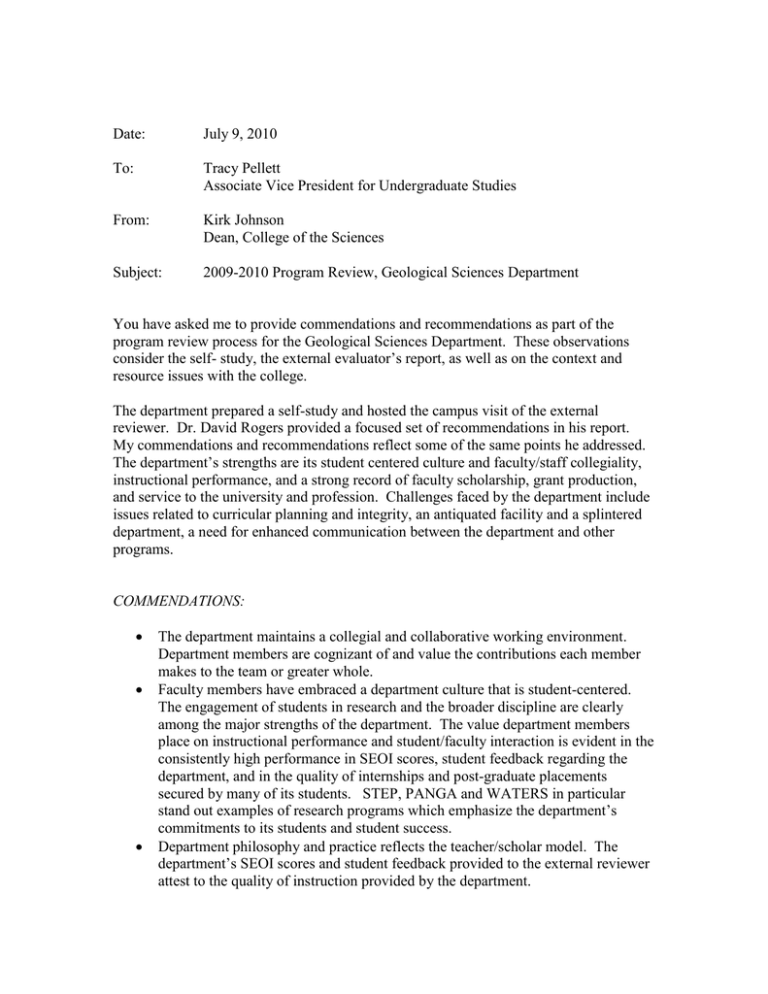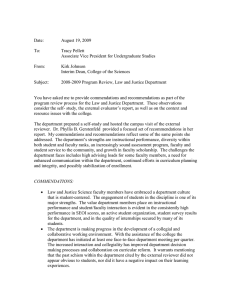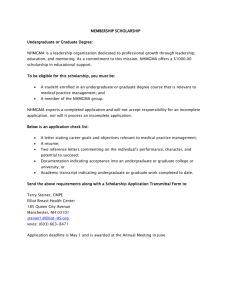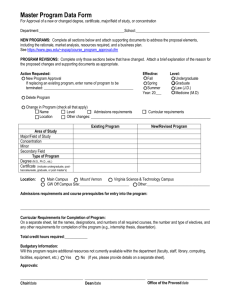Date: July 9, 2010 To:
advertisement

Date: July 9, 2010 To: Tracy Pellett Associate Vice President for Undergraduate Studies From: Kirk Johnson Dean, College of the Sciences Subject: 2009-2010 Program Review, Geological Sciences Department You have asked me to provide commendations and recommendations as part of the program review process for the Geological Sciences Department. These observations consider the self- study, the external evaluator’s report, as well as on the context and resource issues with the college. The department prepared a self-study and hosted the campus visit of the external reviewer. Dr. David Rogers provided a focused set of recommendations in his report. My commendations and recommendations reflect some of the same points he addressed. The department’s strengths are its student centered culture and faculty/staff collegiality, instructional performance, and a strong record of faculty scholarship, grant production, and service to the university and profession. Challenges faced by the department include issues related to curricular planning and integrity, an antiquated facility and a splintered department, a need for enhanced communication between the department and other programs. COMMENDATIONS: The department maintains a collegial and collaborative working environment. Department members are cognizant of and value the contributions each member makes to the team or greater whole. Faculty members have embraced a department culture that is student-centered. The engagement of students in research and the broader discipline are clearly among the major strengths of the department. The value department members place on instructional performance and student/faculty interaction is evident in the consistently high performance in SEOI scores, student feedback regarding the department, and in the quality of internships and post-graduate placements secured by many of its students. STEP, PANGA and WATERS in particular stand out examples of research programs which emphasize the department’s commitments to its students and student success. Department philosophy and practice reflects the teacher/scholar model. The department’s SEOI scores and student feedback provided to the external reviewer attest to the quality of instruction provided by the department. The faculty are actively engaged in high impact nationally and internationally recognized scholarship as evidenced by the department’s overall rate of publications, conference presentations and grant awards. The department has made great strides toward the implementation of a credible programmatic assessment plan and is beginning to consider assessment results in curricular planning. The department contributes to the broader university mission through the provision of service coursework for other majors and the general education program. Geological Sciences faculty members participate in a broad array of service activities in the community and in university governance. RECOMMENDATIONS: Faculty Mentoring and Evaluation of Faculty with Joint Appointments: The external reviewer notes that the department should develop a formal mentoring process to integrate new faculty into the department and to consistently prepare them to succeed and know what the standards of performance are for successful progress toward tenure and promotion. In addition, a recent position search for a faculty member with a shared appointment in Geological Sciences and Science Education revealed that department members were unaware of the mutually agreed upon standards of evaluation between the two departments. The department should review the standards for those occupying shared appointments. Curricular Standards/ Integrity: The external reviewer points to three concerns which the department should address. First, the scheduling times for lowerdivision mathematics, chemistry, physics, and lower-division geology often conflict with one another. The department is advised to review its curriculum in light of this finding, and to maintain direct contacts with Mathematics, Physics, and Chemistry departments to see if a these bottlenecks can be resolved. The department should also reinstate its past practice of developing a long-term plan for course offerings. This would require the development of a consistent cycle for all (major and supporting) courses. Information regarding whether a class is offered each quarter, only once a year, or only on an every other year basis ought to be readily available to students. If this information is still available, perhaps the department could find a way to make its existence more broadly known to students. Second, partially as a result of the above, prerequisites are not being enforced rigorously. Having prerequisites on the books that are not enforced not raises integrity concerns and it slows down progress in upper-division and graduate courses when faculty have to cover material students should already have mastered. Third, graduate students question the level of academic rigor experienced in blended undergraduate/ graduate courses. The department should consider either upping the demands present in these courses in order to receive graduate credit, or splitting the courses if possible. Facilities: Although the department recently gained access to more space in Lind Hall due to Geography’s move to an updated Dean Hall, Geology faculty are still not located in one building. Three locations still used by the department (the old Steam Plant, Lind Hall and Hebeler Hall are historic buildings on the main campus which lack proper facilities for modern classroom instruction and scholarly productivity. Hopefully this lack of integration and outdated classroom and laboratory furnishings can be addressed by continued progress on Science Phase II. SUMMARY: In summary, the Geological Sciences Department has a strong student-centered identity with a well defined disciplinary focus when it comes to its undergraduate and graduate mission. The department’s faculty members maintain a strong record of instructional performance and have generated an outstanding record of contributions to scholarship However, there is work to be done when it comes to faculty mentoring, curricular planning and course integrity.



